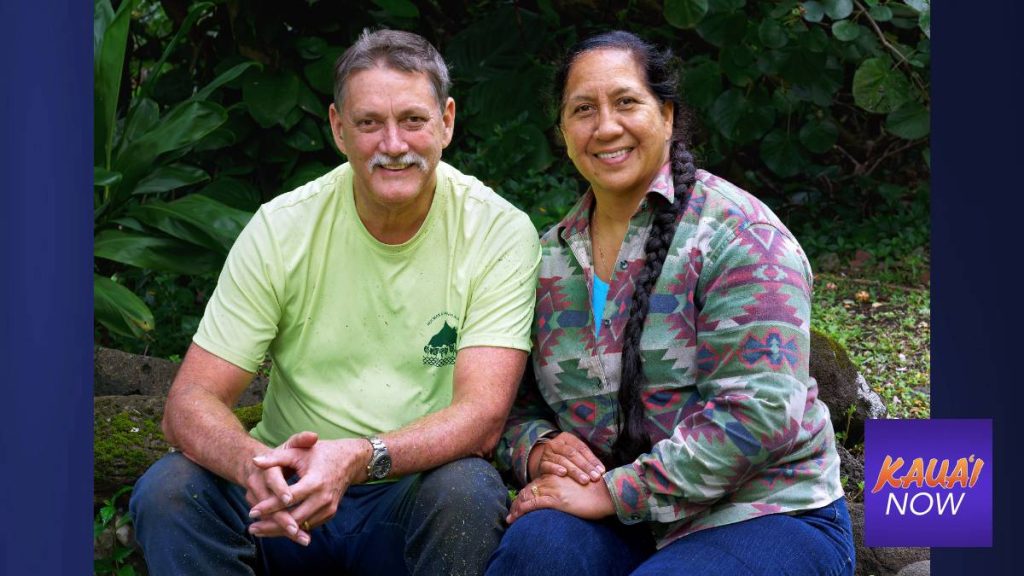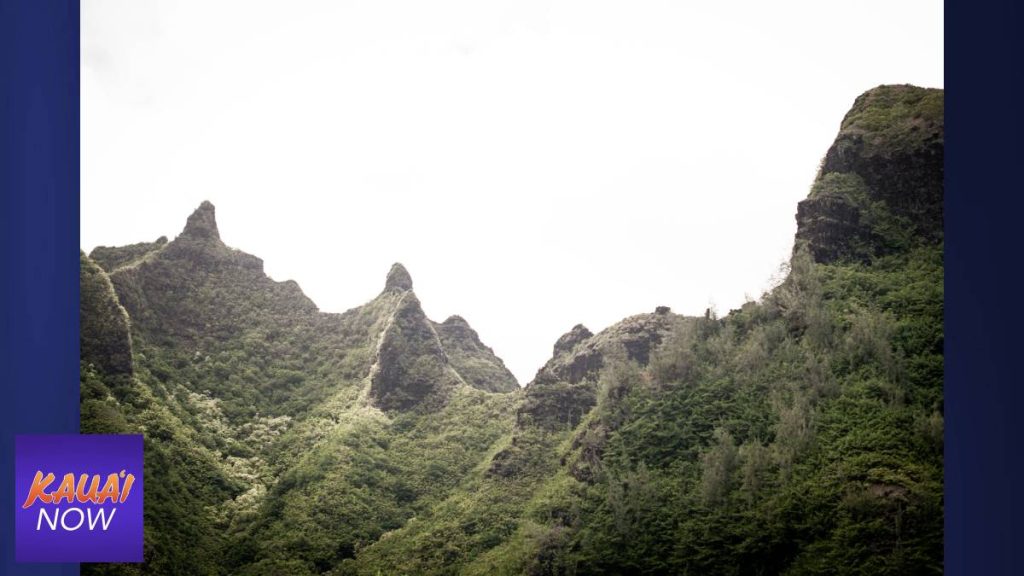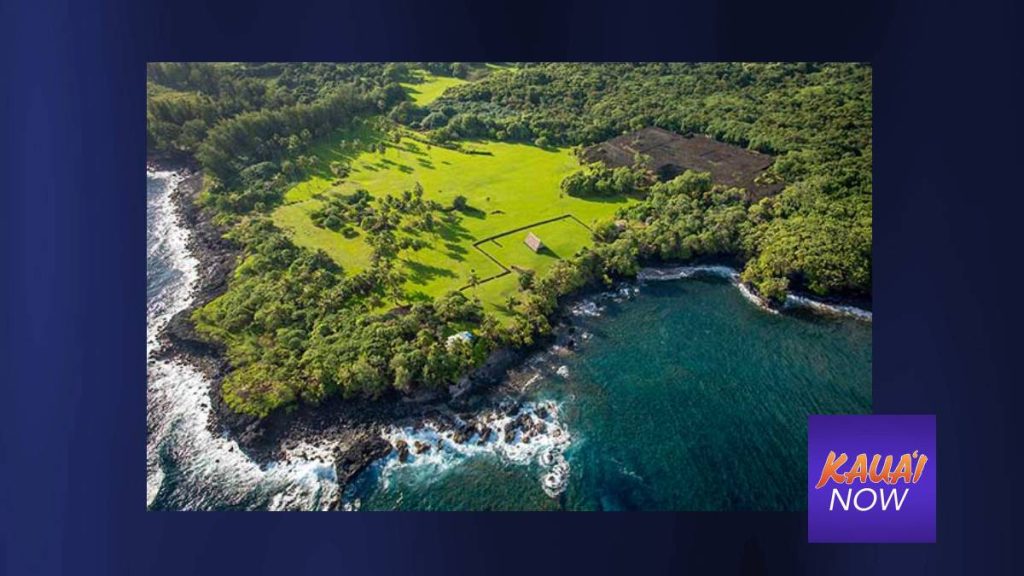Kaua‘i couple retires from botanical garden – but continues to nurture their community

Charles R. “Chipper” and Hau‘oli Wichman are no longer president and executive assistant of the National Tropical Botanical Garden. After nearly 50 years of acclaimed work for the nonprofit organization headquartered on Kaua‘i, they have retired.
It was quite a run, especially for Chipper, considering his first day on the job. While on a drive to inspect an especially-impressive jackfruit tree — he was told by his new boss: “I know all about you. The only reason you’re here is because of your grandmother, and I can’t wait to kick you out.”
Chipper, born in 1957 and raised between Kaua‘i and O‘ahu, was a self-described “challenging teenager.” He had returned to The Garden Isle after muddling through two semesters at the University of Colorado and a landscaping gig on O‘ahu.
His grandmother, Juliet Rice Wichman, had deep roots in the Kaua‘i community and secured her wayward grandson a yearlong internship at the National Tropical Botanical Garden (then known as the Pacific Tropical Botanical Garden) on the island’s South Shore.
The boss who delivered those grim words to Chipper was Dan Moriarty, who would go on to manage the Kīlauea Point National Wildlife Refuge from 1979 to 1990. (Under his leadership, the North Shore site and its large colony of seabirds became one of the most popular visitor destinations on the island; the Friends of Kauaʻi Wildlife Refuges have awarded annual scholarships in Moriarty’s name since 1998.)
But Moriarty did not err when he told Chipper he wouldn’t last long at the botanical garden.
“I found out later he did not want to see me fail,” said Chipper, whose retirement from the office of president was announced on Dec. 31, 2022. “Dan figured the best way to deal with Chipper is give him a challenge on the first day.”
Moriarty was right. Chipper accepted the challenge to prove himself and took a job at the botanical garden after his internship concluded in 1977. Eventually, his managers convinced him to give college another try – so, filled with a newfound sense of purpose, he pursued a bachelor’s degree in horticulture technology at the University of Hawai‘i at Mānoa. When he graduated in 1983, he asked fellow student Hau‘oli Keali‘inohomoku to marry him.
“We actually met in an ethnobotany class and got to know each other in a Hawaiian language class,” Chipper said. “She claims basically that I told her, ‘Well, if you end up marrying me, you end up marrying the garden’ … it proved to be true.”
Hau‘oli, who was born and raised in Nanakuli on the west side of O‘ahu, is as quiet as Chipper is voluble. The first member of her family to graduate college, she has always preferred to operate outside of the limelight as the real brains of the couple, according to her husband.
Indeed Hau‘oli, who shares Chipper’s warm personality, preferred not speak for the majority of Kaua‘i Now’s interview with the couple. However, Chipper would frequently turn to her for a nod of approval or word of advice, before launching into another anecdote of their lives and work together.
Chipper and Hau‘oli spent the following decades literally reshaping the landscapes of Kaua‘i, the Hawaiian Islands and beyond, helping NTBG grow from a 171-acre parcel in the Lāwai Valley to an internationally-recognized science and conservation hub encompassing almost 2,000 acres.
Chipper served as its CEO and Director from 2003 to 2019.
Through the efforts of the Wichmans and others, NTBG’s “living laboratories” are now home to thousands of plant species and the largest collections of native Hawaiian plant species and breadfruit cultivars in existence.
“The Wichmans not only transformed five garden sites in Hawaiʻi and Florida into what has become a leader in plant discovery and biocultural conservation, they have helped introduce the world to the importance of preserving Hawai‘i’s distinctive flora, biological diversity and cultural wealth,” said Janet Mayfield, the current NTBG CEO and Director.
The Wichmans’ long list of accomplishments include:
- the establishment of the 1,000-acre Limahuli Garden and Preserve on the North Shore of Kaua‘i
- the restoration of the largest ancient structure in all of Polynesia on Maui’s Hana coast
- the creation of the Juliet Rice Wichman Botanical Research Center on Kaua‘i, which houses a seed bank, laboratory, herbarium and library under one hurricane-resistant roof
- participation in the International Union for Conservation of Nature World Conservation Congress held in Honolulu in 2016.
Chipper said the 2016 event likely represents the couple’s crowning achievement. The congress had never been allowed into the United States, in the 70-year history of the International Union for Conservation of Nature.
“We pull it off against all odds and it put Hawai‘i on the map,” he said. “It’s been transformational for conservation in Hawai‘i.”
The 2016 IUCN World Conservation Congress hosted 10,400 delegates from 192 countries, according to Chipper.
“It was incredible,” he said. “They asked me to give the closing keynote talk at the Congress, which is something I’ll never forget.”
The Wichmans also have been involved in community projects. Chipper was recently named one of several Kauaians responsible for the Hāʻena State Park shuttle system, which has greatly reduced tourism-related overcrowding that kept local residents from accessing their own public spaces.
Another of their ongoing projects includes potential changes to the state’s management of approximately 100 cabins located throughout the Kōkeʻe and Waimea Canyon state parks on the rugged West Side of Kaua‘i.
The cabins – some of which have been leased by local families for 100 years – represent a unique community replicated nowhere else in Hawai‘i, according to Chipper, who is currently president of the Kōke’e Leaseholder Association.
The State of Hawai‘i resumes control of each cabin when its lease ends. It then auctions new leases in a process effectively limited to residents of Kaua‘i.
“There is a continual pool of cabins that are available to the local community … But the problem is, we’ve got a lot of really wealthy residents on Kaua‘i,” Chipper said. “We’ve got seven [cabins] coming out to auction this year and they’re likely to go for far more than many local residents can afford.”
Despite news of their recent retirement, the Wichmans aren’t ready to stop just yet, although they will now spend more time with their family, which includes two children and two grandchildren living on O‘ahu.
“We’re not retiring to sit around in a rocking chair or go play golf,” said Chipper. “We’re going to put more time and energy into our community.”









